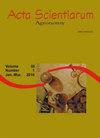Estimation of genetic parameters and selection gains for sweet potato using Bayesian inference with a priori information
IF 1.2
4区 农林科学
Q3 AGRONOMY
引用次数: 0
Abstract
The selection of superior sweet potato genotypes using Bayesian inference is an important strategy for genetic improvement. Sweet potatoes are of social and economic importance, being the material for ethanol production. The estimation of variance components and genetic parameters using Bayesian inference is more accurate than that using the frequently used statistical methodologies. This is because the former allows for using a priori knowledge from previous research. Therefore, the present study estimated genetic parameters and selection gains, predicted genetic values, and selected sweet potato genotypes using a Bayesian approach with a priori information. Root shape, soil insect resistance, and root and shoot productivity of 24 sweet potato genotypes were measured. Heritability, genotypic variation coefficient, residual variation coefficient, relative variation index, and selection gains direct, indirect and simultaneous were estimated, and the data were analyzed using Bayesian inference. Data from 11 experiments were used to obtain a priori information. Bayesian inference was a useful tool for decision-making, and significant genetic gains could be achieved with the selection of the evaluated genotypes. Root shape, soil insect resistance, commercial root productivity, and total root productivity showed higher heritability values. Clones UFVJM06, UFVJM40, UFVJM54, UFVJM09, and CAMBRAIA can be used as parents in future breeding programs.基于先验信息的甘薯遗传参数估计与选择增益的贝叶斯推理
利用贝叶斯推理选择甘薯优良基因型是遗传改良的重要策略。红薯作为生产乙醇的原料,具有重要的社会和经济意义。使用贝叶斯推理对方差分量和遗传参数的估计比使用常用的统计方法更准确。这是因为前者允许使用先前研究的先验知识。因此,本研究利用具有先验信息的贝叶斯方法估计遗传参数和选择增益,预测遗传值,并选择甘薯基因型。测定了24个甘薯基因型的根形、土壤抗虫性和根冠生产力。估计遗传率、基因型变异系数、剩余变异系数、相对变异指数以及直接、间接和同时的选择增益,并利用贝叶斯推理对数据进行分析。利用11个实验的数据获得先验信息。贝叶斯推理是一个有用的决策工具,通过评估基因型的选择可以获得显着的遗传收益。根形、土壤抗虫性、商品根生产力和总根生产力具有较高的遗传值。克隆UFVJM06、UFVJM40、UFVJM54、UFVJM09和CAMBRAIA可作为未来育种计划的亲本。
本文章由计算机程序翻译,如有差异,请以英文原文为准。
求助全文
约1分钟内获得全文
求助全文
来源期刊

Acta Scientiarum. Agronomy.
Agricultural and Biological Sciences-Agronomy and Crop Science
CiteScore
2.40
自引率
0.00%
发文量
45
审稿时长
>12 weeks
期刊介绍:
The journal publishes original articles in all areas of Agronomy, including soil sciences, agricultural entomology, soil fertility and manuring, soil physics, physiology of cultivated plants, phytopathology, phyto-health, phytotechny, genesis, morphology and soil classification, management and conservation of soil, integrated management of plant pests, vegetal improvement, agricultural microbiology, agricultural parasitology, production and processing of seeds.
 求助内容:
求助内容: 应助结果提醒方式:
应助结果提醒方式:


